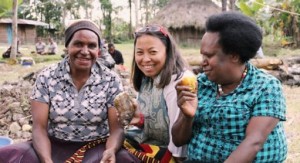Local people call Sarlota Itlay ‘Mama Sarlota’. The 41 year old widow lives with her four children in Musaima village, a mountainous district in the Baliem Valley of West Papua.
Local people call Sarlota Itlay ‘Mama Sarlota’. The 41 year old widow lives with her four children in Musaima village, a mountainous district in the Baliem Valley of West Papua.
 She has been a smallholder farmer her whole life, farming for a living. She earnt very little money, and couldn’t afford to pay her children’s school fees.
She has been a smallholder farmer her whole life, farming for a living. She earnt very little money, and couldn’t afford to pay her children’s school fees.
Planting sweet potatoes (called ubi) is not a new thing for Sarlota. But until joining Oxfam’s project in 2009, she only planted enough ubi to feed her family.
Sweet potato has been the main staple food in the area for millennia. But the arrival of migrants from other parts of Indonesia – people who use rice as a staple food – has influenced the indigenous Papuans, whose diet has shifted from ubi to rice.
Adding value
In 2009, Sarlota joined the farmers’ group in her village. Oxfam’s partner Yapum supported the group by opening up 10 hectares of land for ubi cultivation. Yapum provides training, seeds and technical support to farmers and improves processing and preservation techniques, for example, turning ubi into flour.
Sarlota and the group also now benefit from improved access to local and regional markets and increasing government and private sector support for Papuan business enterprises. The farmers work together as group, supporting and motivating each other to make sure the project is successful and sustainable.
Sarlota believes that the guidance and support provided by Oxfam and YAPUM is beginning to show signs of success. “We earned quite a lot of money from the group harvest. Besides that, I also learned a lot about farm management and leadership,” Sarlota said.
“Our wealth lies in our land”
In 2010 Sarlota was trusted as the head of the Musaima farmer group, which is quite an achievement for a Papuan woman. Many Papuan men still oppose the idea of having women voicing their opinions in a village meeting.Through this project, Mama Sarlota has increased her family income and even managed to send her oldest daughter to university.
“I am so happy now I can fulfill my family needs,” said Sarlota. However, this project is not just about increasing family income. For her it is also about going back to a traditional crop that plays an important part of Papuan culture.
“Our wealth lies in our land,” she said. “When we eat rice, it is not fulfilling. Only ubi can satisfy us,” she said.
This initiative forms part of the Papua Enterprise Development Program (PEDP), which supports rural agricultural businesses in remote areas of Papua, one of Indonesia’s most challenging regions.



